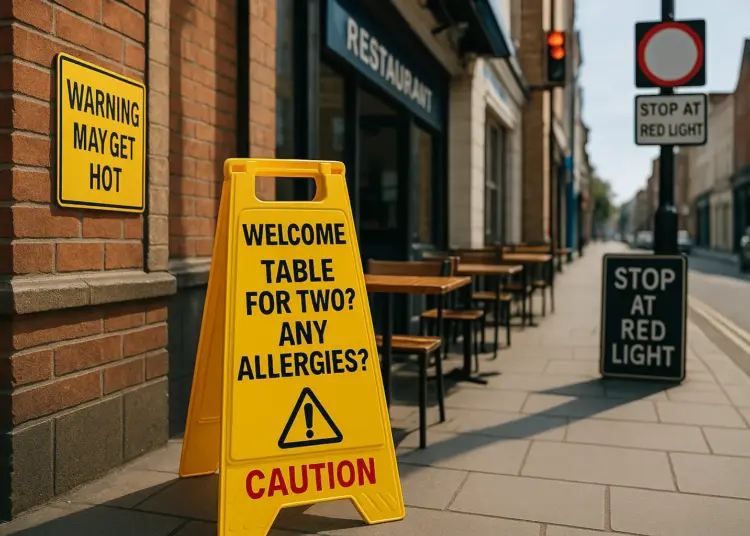Story Highlight
– UK health and safety measures perceived as excessive by visitors.
– Anthony Peregrine critiques UK’s approach compared to France.
– France boasts widespread tourism offices in towns and villages.
– UK has fewer family-run restaurants than France.
– Public transport in the UK is notably reliable and frequent.
Full Story
The United Kingdom is renowned for its rigorous approach to health and safety, with regulations serving as a constant reminder of caution. From the moment one sets foot in the country, the ubiquity of safety warnings can be striking, especially for visitors. This was notably highlighted by Anthony Peregrine, a travel expert for The Telegraph, during his recent return to the UK after several years living in France. His observations regarding the UK’s heightened health and safety measures provide an intriguing perspective on cultural differences between the two nations.
Peregrine remarked on his experience, stating that the UK’s commitment to health and safety measures appears to have escalated significantly over the years. In his piece for The Telegraph, he noted, “The health-and-safety obsession has gone into overdrive.” This sentiment was echoed in his encounters at various dining establishments, where he frequently heard the query, “Welcome. Table for two? Any allergies?” This proactive approach, while well-meaning, led Peregrine to reflect on the broader implications of such extensive precautions.
He elaborated, suggesting that the UK’s tendency to preemptively shield individuals from potential harm may stem from a belief that the average British citizen requires protection from myriad dangers. He pointedly observed that this trend implies a perception of Britons as lacking in both courage and resilience. He illustrated this through everyday examples, such as a toaster warning about high temperatures and reminders to stop at red traffic lights, which he deemed unnecessary.
With years of experience straddling the cultures of both France and the UK, Peregrine is well-placed to delineate the distinctions in how each country approaches tourism and hospitality. One notable difference he highlighted is the prevalence of tourism offices throughout France, even in modest towns and villages. According to Peregrine, “Every town in France has a tourist office, as do many villages,” which he attributes, in part, to France’s status as the world’s most popular tourist destination. This begs the question of whether the extensive support for tourists in France is an aspect where they have excelled compared to the UK.
In contrast, Peregrine noted that visitors to the UK often struggle to locate tourist information, suggesting a potential weakness in the country’s tourism strategy. Another point of comparison was the dining landscape; Peregrine observed that France boasts a wealth of family-run establishments that offer an authentic culinary experience, which are far less common in the UK.
He further critiqued the social habits of Britons, pointing to a cultural trend where evenings often end earlier than in other European nations such as Spain, where nightlife is vibrant and extends late into the night. Peregrine’s observations touch on a broader narrative regarding cultural norms, expectations, and practices around dining and socialising.
Conversely, he did acknowledge certain positive aspects of travelling in the UK, particularly praising its public transport system. Peregrine commented on the effectiveness and reliability of the network, stating, “Over 11 days, public transport worked terrifically – frequent, reliable, operated by drivers, especially in Wales.” This appreciation highlights an area where the UK excels, providing visitors with efficient means of getting around.
Beyond his critiques, Peregrine aimed to balance his commentary with a nod to the friendliness of the British population. He referred to them as “jolly,” suggesting that, despite the peculiarities of behaviour and cultural norms that may stand out to a returning expatriate, there remains an innate warmth and hospitality among the people.
In conclusion, Peregrine’s reflections serve to illuminate the cultural contrasts between the UK and France, particularly in relation to health and safety, tourism infrastructure, and social norms. His observations not only reflect personal experiences but also invite a broader dialogue about the evolving nature of hospitality and public engagement in travel across Europe.























We should aim for sensible safeguards that protect people without turning everyday activities into a maze of rules. Practical, proportionate measures keep workers and the public safe while still allowing travel, dining and social life to feel welcoming and enjoyable.
People often confuse sensible safety measures with unnecessary fuss. Practical rules protect staff and the public without stopping people enjoying life. Different countries balance caution and convenience in different ways, and both approaches shape visitor experiences. It is possible to value clear reliable services while also making places feel welcoming and relaxed.